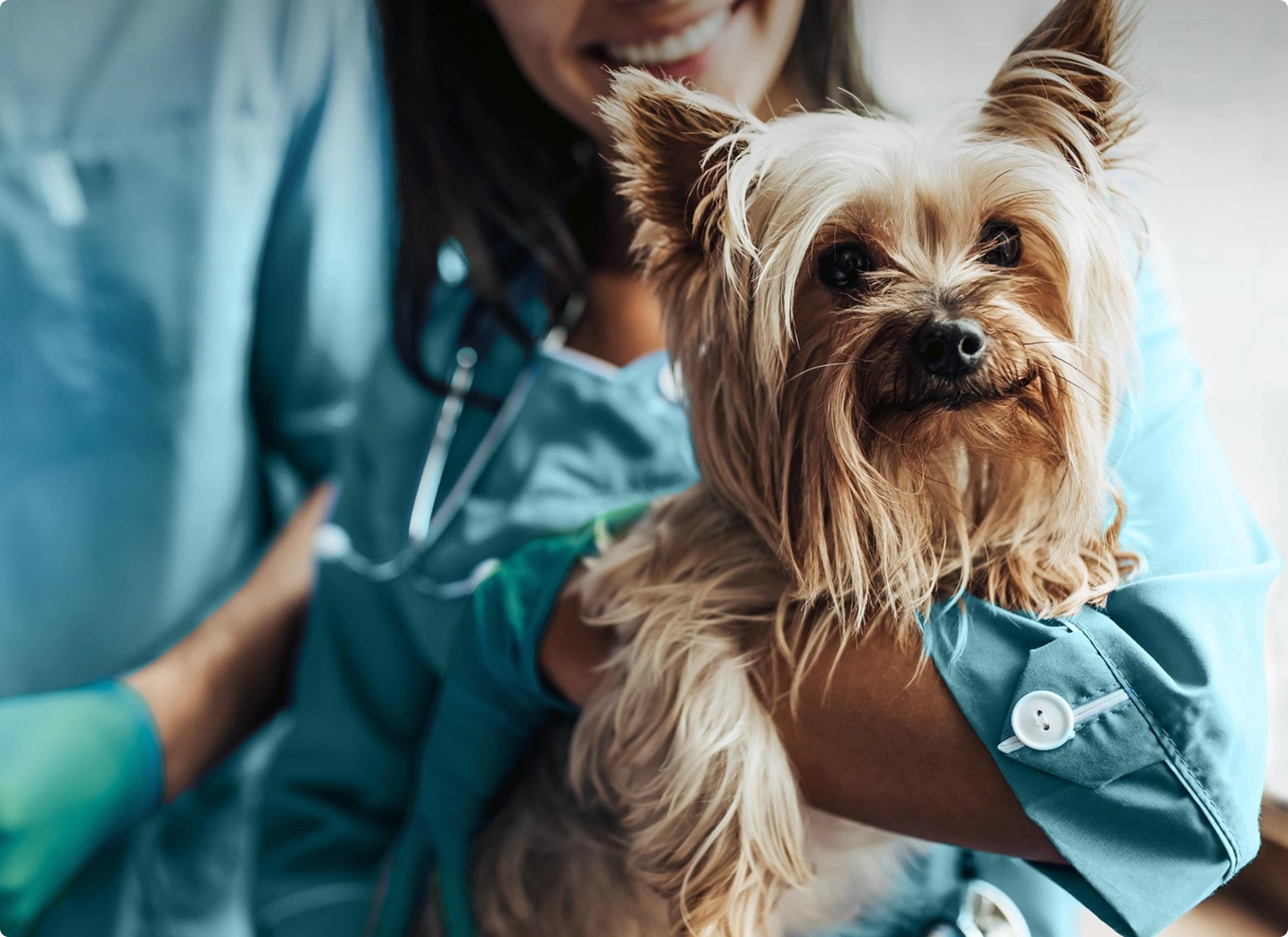
Veterinary Procedures For Dogs Based On Your Dog’s Age



Veterinary Procedures For Dogs Based On Your Dog’s Age
Veterinary recommended procedures
Your dog should see a veterinarian for a full physical examination every year, at this time it can be determined which vaccines and diagnostic tests are necessary and if your dog is sick or injured, seek help immediately.
Regular professional veterinary care is essential to the health of your dog and can add years and quality to it’s life.
Here is the recommended procedures for your dog’s veterinary visits based on it’s age.
6-8 Weeks
This is such a fun and exciting time for both you and your new dog.
Remember that your puppy is still a baby at this point, it is super important that you make an appointment with your veterinarian ASAP!
Your puppy should be visiting your veterinarian every three weeks until they reach 4 months old.
![]() Complete physical examination and fecal screening.
Complete physical examination and fecal screening.
![]() Your dog should receive it’s 1st DHP Parvo vaccine and de-worming procedure.
Your dog should receive it’s 1st DHP Parvo vaccine and de-worming procedure.
![]() Begin a sentinel surveillance program.
Begin a sentinel surveillance program.
![]() Schedule your regular physical examination and vaccination schedule.
Schedule your regular physical examination and vaccination schedule.
![]() Provide basic information about caring for your pet dog, nutrition, parasites, flea control, exercise and training your dog.
Provide basic information about caring for your pet dog, nutrition, parasites, flea control, exercise and training your dog.
9-11 Weeks
Hopefully by now you have a good potty training routine and your puppy has started to socialize.
![]() Complete physical examination.
Complete physical examination.
![]() Your dog should receive it’s 2nd DHP Parvo vaccine and de-worming procedure.
Your dog should receive it’s 2nd DHP Parvo vaccine and de-worming procedure.
![]() Dental check up and oral care guidance.
Dental check up and oral care guidance.
![]() Ear, skin care, and blood testing if needed.
Ear, skin care, and blood testing if needed.
![]() Schedule your regular physical examination and vaccination schedule.
Schedule your regular physical examination and vaccination schedule.
![]() Answer your questions about the best care for your pet dog.
Answer your questions about the best care for your pet dog.
12-14 Weeks
Your puppy’s personality is becoming more obvious at this point, this visit is a perfect time to discuss any behavioral concerns.
Make sure that your puppy is up to date on all of its vaccinations, deworming, flea and heartworm prevention protocols.
![]() Complete physical examination.
Complete physical examination.
![]() Your dog should receive it’s 3rd DHP Parvo vaccine and de-worming procedure.
Your dog should receive it’s 3rd DHP Parvo vaccine and de-worming procedure.
![]() Your dog should receive the Bordetella vaccine.
Your dog should receive the Bordetella vaccine.
![]() Schedule your regular physical examination and vaccination schedule.
Schedule your regular physical examination and vaccination schedule.
![]() Answer your questions about the best care for your pet dog.
Answer your questions about the best care for your pet dog.
16 Weeks
Four months old is a major milestone in the life of your puppy, most vaccines should be completed by around this stage and housetraining should be mostly complete.
This is a good time to discuss plans for spaying or neutering your puppy.
![]() Complete physical examination.
Complete physical examination.
![]() Your dog should receive it’s 4th DHP Parvo vaccine.
Your dog should receive it’s 4th DHP Parvo vaccine.
![]() Your dog should receive the Rabies and Leptospirosis vaccines.
Your dog should receive the Rabies and Leptospirosis vaccines.
![]() Schedule your regular physical examination and vaccination schedule.
Schedule your regular physical examination and vaccination schedule.
![]() Answer your questions about the best care for your pet dog.
Answer your questions about the best care for your pet dog.
4-6 Months
This is when a puppy turns into a teenager and therefore training is very important. Most puppies are spayed or neutered during this stage and this is also a good time to discuss diet/nutrition and make sure your dog is on a good flea and tick and heartworm prevention plan.
![]() Complete physical examination.
Complete physical examination.
![]() Nutrition and weight, breed specific concerns, and parasite control.
Nutrition and weight, breed specific concerns, and parasite control.
![]() In case of spaying or neutering, your vet will perform pre-surgical examination ad blood tests.
In case of spaying or neutering, your vet will perform pre-surgical examination ad blood tests.
![]() Surgical altering and hip radiographs if needed.
Surgical altering and hip radiographs if needed.
![]() Schedule your regular physical examination and vaccination schedule.
Schedule your regular physical examination and vaccination schedule.
![]() Answer your questions about the best care for your pet dog.
Answer your questions about the best care for your pet dog.
1 Year
Your dog is now full-grown, some breeds will have issues with weight that need to be discussed with your veterinarian.
Exercise will play a crucial role in both behavior, weight and quality of life for your dog.
![]() Annual physical examination.
Annual physical examination.
![]() Nutrition and weight, review optimal weight and nutrition guidelines.
Nutrition and weight, review optimal weight and nutrition guidelines.
![]() Your vet should offer the vaccine boosters for your dog.
Your vet should offer the vaccine boosters for your dog.
![]() Annual DA2P-P combo vaccine, Bordetella* vaccine – 6 month vax. Rabies vaccine (3 year)
Annual DA2P-P combo vaccine, Bordetella* vaccine – 6 month vax. Rabies vaccine (3 year)
![]() Fecal analysis, heartworm test, refill of flea, tick and heartworm prevention.
Fecal analysis, heartworm test, refill of flea, tick and heartworm prevention.
![]() Schedule your regular physical examination and vaccination schedule.
Schedule your regular physical examination and vaccination schedule.
![]() Answer your questions about the best care for your pet dog.
Answer your questions about the best care for your pet dog.
2 Years
Two years old need a lot of attention and exercise.
Some large breeds may show signs of congenital joint issues at this time, if you have a large breed it would be a good time to discuss musculoskeletal health.
![]() Complete physical examination.
Complete physical examination.
![]() Nutrition and weight, review optimal weight and nutrition guidelines.
Nutrition and weight, review optimal weight and nutrition guidelines.
![]() For large breeds, review musculoskeletal issues.
For large breeds, review musculoskeletal issues.
![]() Parvo vaccine (3 year) Bordetella, Vaccine – every 6 months.
Parvo vaccine (3 year) Bordetella, Vaccine – every 6 months.
![]() Fecal analysis, heartworm test, wellness panel.
Fecal analysis, heartworm test, wellness panel.
![]() Schedule your regular physical examination and vaccination schedule.
Schedule your regular physical examination and vaccination schedule.
![]() Answer your questions about the best care for your pet dog.
Answer your questions about the best care for your pet dog.
3-5 Years
In the 3-5 year age range, most dogs will need their first dental cleaning performed by a veterinarian.
Wellness check-ups are the cornerstone of longevity and avoiding behavioral and medical problems.
![]() Annual physical examination.
Annual physical examination.
![]() Nutrition and weight, review optimal weight and nutrition guidelines.
Nutrition and weight, review optimal weight and nutrition guidelines.
![]() For large breeds, review musculoskeletal issues.
For large breeds, review musculoskeletal issues.
![]() Your dog should receive DHP vaccine (3 year) and Bordetella vaccine (given every 6 months).
Your dog should receive DHP vaccine (3 year) and Bordetella vaccine (given every 6 months).
![]() Performing required dental procedures.
Performing required dental procedures.
![]() Fecal analysis, heartworm test, wellness panel.
Fecal analysis, heartworm test, wellness panel.
![]() Schedule your regular physical examination and vaccination schedule.
Schedule your regular physical examination and vaccination schedule.
![]() Answer your questions about the best care for your pet dog.
Answer your questions about the best care for your pet dog.
6-8 Years
Almost all breeds will show some signs of aging by 6-8 years old.
Diet and nutrition are especially important to helping your dog age well.
This may be a good time to have an open discussion about supplements.
![]() Annual physical examination.
Annual physical examination.
![]() Nutrition and weight, review optimal weight and nutrition guidelines.
Nutrition and weight, review optimal weight and nutrition guidelines.
![]() For large breeds, review musculoskeletal issues.
For large breeds, review musculoskeletal issues.
![]() Your dog should receive DHP vaccine (3 year) and Bordetella vaccine (given every 6 months).
Your dog should receive DHP vaccine (3 year) and Bordetella vaccine (given every 6 months).
![]() Performing required dental procedures.
Performing required dental procedures.
![]() Fecal analysis, heartworm test, wellness panel.
Fecal analysis, heartworm test, wellness panel.
![]() Schedule your regular physical examination and vaccination schedule.
Schedule your regular physical examination and vaccination schedule.
![]() Answer your questions about the best care for your pet dog.
Answer your questions about the best care for your pet dog.
9-11 Years
Large breeds age faster than small breeds, however by 9-11 years old, most dogs are entering their senior years.
Help keep them at their best with preventive care, good nutrition and a focus on weight and exercise.
![]() Annual physical examination.
Annual physical examination.
![]() Nutrition and weight, review optimal weight and nutrition guidelines.
Nutrition and weight, review optimal weight and nutrition guidelines.
![]() For large breeds, review musculoskeletal issues.
For large breeds, review musculoskeletal issues.
![]() Your dog should receive Rabies vaccine (3 year) and Bordetella vaccine (given every 6 months).
Your dog should receive Rabies vaccine (3 year) and Bordetella vaccine (given every 6 months).
![]() Performing required dental procedures.
Performing required dental procedures.
![]() Fecal analysis, heartworm test plus, wellness panel.
Fecal analysis, heartworm test plus, wellness panel.
![]() Schedule your regular physical examination and vaccination schedule.
Schedule your regular physical examination and vaccination schedule.
![]() Answer your questions about the best care for your pet dog.
Answer your questions about the best care for your pet dog.
12 Years and Over
By this stage most dogs will have some form of a chronic illness and we highly recommend semi-annual wellness exams.
Pain management is often neglected because most owners are unaware of the subtle yetserious signs of pain in older dogs to maintain a high quality of life in it’s senior years.
![]() Semi-annual physical examination.
Semi-annual physical examination.
![]() Nutrition, diet, and supplements.
Nutrition, diet, and supplements.
![]() Special attention to arthritis and other painful conditions.
Special attention to arthritis and other painful conditions.
![]() Your dog should receive Parvo vaccine (3 year) and Bordetella vaccine (given every 6 months).
Your dog should receive Parvo vaccine (3 year) and Bordetella vaccine (given every 6 months).
![]() Performing required dental procedures.
Performing required dental procedures.
![]() Fecal analysis, heartworm test plus, senior wellness panel.
Fecal analysis, heartworm test plus, senior wellness panel.
![]() Schedule your regular physical examination and vaccination schedule.
Schedule your regular physical examination and vaccination schedule.
![]() Answer your questions about the best care for your pet dog.
Answer your questions about the best care for your pet dog.





